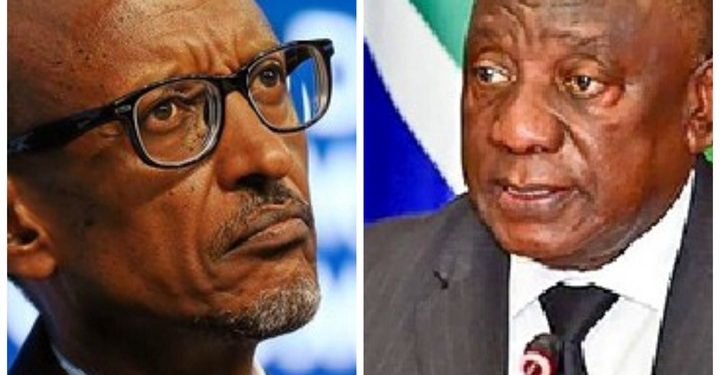A diplomatic row has erupted between Rwandan President Paul Kagame and South African President Cyril Ramaphosa following remarks by Ramaphosa referring to the Rwanda Defence Force (RDF) as a “militia.” Kagame has strongly condemned the comment, describing it as misleading, offensive, and a direct affront to Rwanda’s sovereignty.
The controversy arose during a recent diplomatic briefing where Ramaphosa reportedly characterized the RDF’s military presence in the eastern Democratic Republic of Congo (DRC) as that of a militia, a term typically associated with irregular armed groups. Kagame wasted no time in firing back, defending the RDF as a disciplined and professional national army.
“We Are Not a Militia”
In a pointed response, Kagame dismissed Ramaphosa’s description as a gross misrepresentation of the RDF’s operations and its contributions to regional stability.
“We are not a militia. The RDF is a professional force that has played a crucial role in ensuring stability in the region,” Kagame stated. He further accused Ramaphosa of undermining Rwanda’s efforts and deliberately distorting its role in peacekeeping and counterinsurgency operations in the DRC.
The Rwandan leader also criticized what he described as South Africa’s inconsistent leadership in addressing security concerns in the Great Lakes region.
“If South Africa is truly committed to peace in the Great Lakes region, it should focus on constructive dialogue rather than mischaracterizing Rwanda’s role,” Kagame said.
Strained Relations and Lingering Tensions
This latest spat adds to the already strained relations between Rwanda and South Africa, which have been marred by years of diplomatic disagreements. The tension largely stems from allegations of Rwandan involvement in political assassinations on South African soil, including the killing of exiled Rwandan dissidents.
Analysts suggest that Ramaphosa’s remarks may be linked to South Africa’s longstanding support for the Congolese government, which has accused Rwanda of backing the M23 rebel group operating in eastern DRC. Rwanda has consistently denied these allegations, maintaining that its military presence in the region is aimed at countering threats posed by armed groups that destabilize its borders.
Regional Implications and Calls for Dialogue
The fallout from Ramaphosa’s comments risks further complicating efforts to stabilize the eastern DRC, a region already plagued by decades of conflict involving multiple armed groups. Rwanda and South Africa, both key players in the African Union (AU) and regional diplomacy, are now under pressure to de-escalate tensions to prevent a diplomatic crisis.
Experts have called for urgent dialogue between the two leaders.
“This is not the time for finger-pointing or inflammatory rhetoric,” said Dr. Amanda Nkosi, a regional conflict analyst. “Both countries must engage in constructive dialogue to ensure that regional stability efforts are not derailed.”
SADC and AU Monitoring the Situation
The Southern African Development Community (SADC) and the AU are expected to monitor the situation closely, given the potential ramifications for regional peace and cooperation. Observers have noted that the strained relationship between Rwanda and South Africa could weaken collective efforts to address the DRC’s challenges, including the disarmament of rebel groups and the protection of civilians.
While South Africa has yet to officially respond to Kagame’s remarks, diplomatic insiders suggest that Ramaphosa’s comments may have been a misstep in an already complex political landscape.
Kagame’s Stand on Rwanda’s Sovereignty
Kagame’s sharp response signals that Rwanda will not tolerate what it perceives as attacks on its national integrity. The Rwandan president has long positioned the RDF as a cornerstone of the country’s security and regional diplomacy.
“Rwanda has always stood for stability and peace in this region. Mischaracterizing our efforts only undermines the progress we’ve achieved,” Kagame said.
What’s Next?
As tensions simmer, the prospect of dialogue remains uncertain. Whether Ramaphosa will clarify or retract his statement is unclear, but Kagame’s strong rebuke underscores Rwanda’s firm stance on defending its sovereignty and military reputation.
For now, the incident serves as a stark reminder of the fragile relationships and overlapping interests among African nations working to address one of the continent’s most enduring conflicts.






















